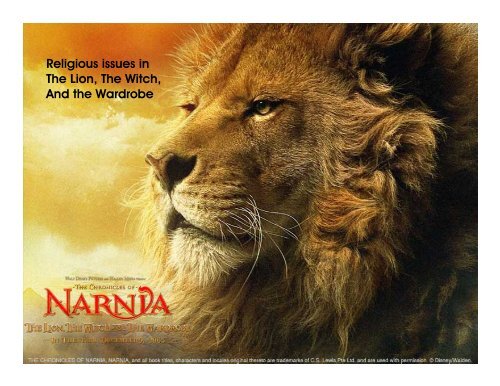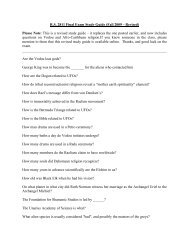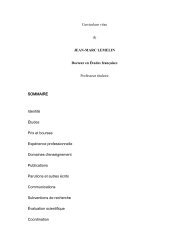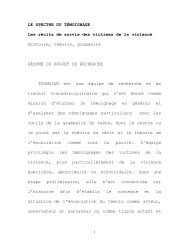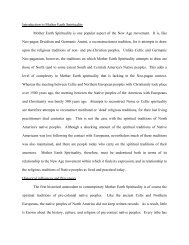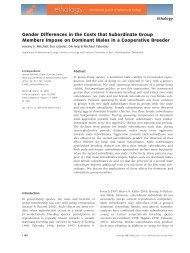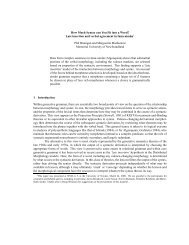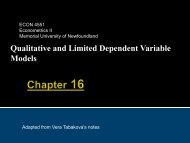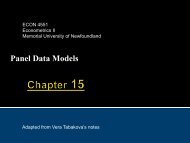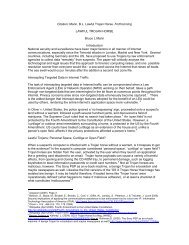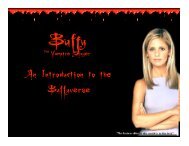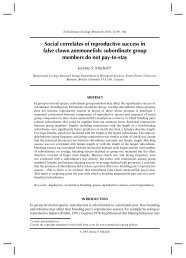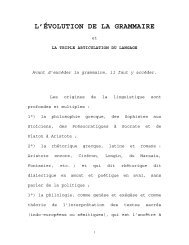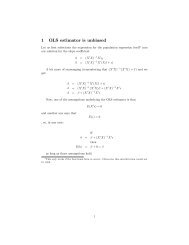The Lion, the Witch and the Wardrobe
The Lion, the Witch and the Wardrobe
The Lion, the Witch and the Wardrobe
You also want an ePaper? Increase the reach of your titles
YUMPU automatically turns print PDFs into web optimized ePapers that Google loves.
Religious issues in<br />
<strong>The</strong> <strong>Lion</strong>, <strong>The</strong> <strong>Witch</strong>,<br />
And <strong>the</strong> <strong>Wardrobe</strong>
• Clive Staples Jack Lewis<br />
(1898-1963) <br />
• Irish author <strong>and</strong> scholar of<br />
medieval literature, Christian<br />
apologetics, fiction.<br />
• Member of <strong>the</strong> Inklings (with J. R.<br />
R. Tolkien) <br />
• Raised Christian, became a<strong>the</strong>ist at<br />
age13, converted to Christianity at<br />
age 31. <br />
• Best know for <strong>The</strong> Chronicles of<br />
Narnia - over 100 million copies<br />
sold. <br />
• Disney adaptation of <strong>The</strong> <strong>Lion</strong>, <strong>the</strong><br />
<strong>Witch</strong> <strong>and</strong> <strong>the</strong> <strong>Wardrobe</strong> grossed<br />
US$ 745,000,000 worldwide<br />
(Prince Caspian grossed US$<br />
419,651,000) <br />
C.S. Lewis
C.S. Lewis <br />
• Conversion to Christianity <br />
• “You must picture me alone in<br />
that room in Magdalen, night<br />
after night, feeling, whenever<br />
my mind lifted even for a second<br />
from my work, <strong>the</strong> steady,<br />
unrelenting approach of Him<br />
whom I so earnestly desired not<br />
to meet. That which I greatly<br />
feared had at last come upon me.<br />
In <strong>the</strong> Trinity Term of 1929 I<br />
gave in, <strong>and</strong> admitted that God<br />
was God, <strong>and</strong> knelt <strong>and</strong> prayed:<br />
perhaps, that night, <strong>the</strong> most<br />
dejected <strong>and</strong> reluctant convert in<br />
all Engl<strong>and</strong>.”
Christian Apologetics in <strong>The</strong><br />
Chronicles of Narnia? <br />
• In Mere Christianity, Lewis<br />
writes… A man who was merely a<br />
man <strong>and</strong> said <strong>the</strong> sort of things Jesus said<br />
would not be a great moral teacher. He<br />
would ei<strong>the</strong>r be a lunatic - on a level with<br />
<strong>the</strong> man who says he is a poached egg - or<br />
else he would be <strong>the</strong> Devil of Hell [<strong>the</strong><br />
Great Liar]. You must make your choice.<br />
Ei<strong>the</strong>r this man was, <strong>and</strong> is, <strong>the</strong> Son of God:<br />
or else a madman or something worse. <br />
• In <strong>The</strong> <strong>Lion</strong>, <strong>the</strong> <strong>Witch</strong><br />
<strong>and</strong> <strong>the</strong> <strong>Wardrobe</strong>,<br />
Professor Kirke says to<br />
Peter <strong>and</strong> Susan, <br />
• <strong>The</strong>re are only three possibilities.<br />
Ei<strong>the</strong>r your sister is telling lies, or<br />
she is mad, or she is telling <strong>the</strong><br />
truth. You know she doesnt tell<br />
lies, <strong>and</strong> it is obvious that she is not<br />
mad. For <strong>the</strong> moment <strong>the</strong>n <strong>and</strong><br />
unless any fur<strong>the</strong>r evidence turns<br />
up, we must assume that she is<br />
telling <strong>the</strong> truth.
<strong>The</strong> <strong>Lion</strong>, <strong>the</strong> <strong>Witch</strong> <strong>and</strong> <strong>the</strong> <strong>Wardrobe</strong><br />
(1950)<br />
• Religious <strong>The</strong>mes:<br />
– Death &<br />
Resurrection <br />
– Salvation <br />
– Forgiveness <br />
– Repentence <br />
• Peter, Susan, Edmund <strong>and</strong> Lucy go through <strong>the</strong> <strong>Wardrobe</strong> door, <strong>and</strong> find<br />
<strong>the</strong>mselves in Narnia <br />
• <strong>The</strong> White <strong>Witch</strong> rules in Narnia, making it always winter, but never Christmas <br />
• Edmund betrays his siblings to <strong>the</strong> White <strong>Witch</strong>, but repents <strong>and</strong> is redeemed. <br />
• A great battle is fought, <strong>and</strong> <strong>the</strong> <strong>Witch</strong> is overthrown. <strong>The</strong> children become<br />
kings <strong>and</strong> queens of Narnia
Prince Caspian (1951)<br />
• Religious <strong>the</strong>mes: <br />
– Apostasy <br />
– Faith <br />
• Prince Caspian flees his home when his wicked uncle, who has usurped <strong>the</strong><br />
thrown, plans to kill him. He meets with <strong>the</strong> talking animals of old<br />
Narnia <strong>and</strong> vows to be <strong>the</strong>ir true King.<br />
• Caspian blows Susans magic horn, drawing <strong>the</strong> Pevensie children to<br />
Narnia <strong>The</strong> children fight to restore old Narnia <strong>and</strong> put Caspian on <strong>the</strong><br />
thrown.<br />
• Aslan tells Peter <strong>and</strong> Susan that <strong>the</strong>y are now too old, <strong>and</strong> can never return<br />
to Narnia.
<strong>The</strong> Voyage of <strong>the</strong> Dawn Treader<br />
(1952)<br />
• Religious <strong>The</strong>mes: <br />
– Being Born<br />
Again <br />
– Holy Grail quest <br />
– Bodily<br />
Assumption into<br />
Heaven? <br />
• Lucy, Edmund <strong>and</strong> <strong>the</strong>ir annoying cousin Eustace are pulled into Narnia. <br />
• <strong>The</strong>y join King Caspian on a search for 7 Lords, traveling through strange l<strong>and</strong>s.<br />
Eustace is turned into a dragon, <strong>and</strong> is later saved by Aslan. <br />
• Reepicheep <strong>the</strong> mouse sails west to Aslans kingdom. <br />
• Lucy <strong>and</strong> Edmund are told <strong>the</strong>y are now too old to return to Narnia, <strong>and</strong> must learn<br />
to find Aslan in <strong>the</strong>ir own world by ano<strong>the</strong>r name.
<strong>The</strong> Silver Chair (1953) <br />
• Religious <strong>The</strong>mes: <br />
– Resurrection via<br />
Gods blood <br />
– Failure to follow<br />
Gods signs<br />
leads to hell <br />
• Eustace <strong>and</strong> Jill are drawn to Narnia while trying to escape school bullies. <br />
• <strong>The</strong>y are given <strong>the</strong> task of finding Prince Rilian, King Caspians son. <strong>The</strong>y must<br />
follow Aslans signs, <strong>and</strong> grant a request asked for in Aslans name. <br />
• Although <strong>the</strong>y do not follow all <strong>the</strong> signs, <strong>and</strong> find <strong>the</strong>mselves captives in <strong>the</strong><br />
underworld as a result, <strong>the</strong>y do grant <strong>the</strong> request of a young man tied to a silver chair,<br />
<strong>and</strong> free him, thus rescuing <strong>the</strong> prince. <br />
• <strong>The</strong>y return to Narnia, <strong>and</strong> <strong>the</strong>n to Earth,
<strong>The</strong> Horse <strong>and</strong> His Boy (1954)<br />
• Religious<br />
<strong>The</strong>mes: <br />
– Parallels to <strong>the</strong><br />
story of Moses <br />
• Shasta, a foundling, runs away with <strong>the</strong> talking horse Bree to find a better life. He<br />
meets Aravis, a noblewoman fleeing an arranged marriage, <strong>and</strong> her talking horse<br />
Hwin. <br />
• Through various adventures, <strong>the</strong>y learn that <strong>the</strong> Calormene army is marching on<br />
Archenl<strong>and</strong> <strong>and</strong> Narnia. <strong>The</strong>y warn <strong>the</strong> leaders of <strong>the</strong>se countries, <strong>and</strong> <strong>the</strong> Calormene<br />
army is defeated. <br />
• Shasta is revealed as <strong>the</strong> long lost elder twin heir to <strong>the</strong> throne of Narnia. He later<br />
marries Aravis.
<strong>The</strong> Magicians Nephew (1955)<br />
• Religious <strong>The</strong>mes: <br />
– Creation <br />
– Fall from Grace <br />
– Temptation <br />
– Forgiveness <br />
• Diggory <strong>and</strong> Polly touch some magic rings, <strong>and</strong> are drawn into <strong>the</strong> world of Charn,<br />
where <strong>the</strong>y wake <strong>the</strong> evil queen Jadis from a frozen slumber. <br />
• She follows <strong>the</strong>m to earth, <strong>and</strong> in an attempt to send her back, <strong>the</strong> children<br />
accidentally transport <strong>the</strong>mselves <strong>and</strong> <strong>the</strong> evil queen to Narnia at <strong>the</strong> moment of<br />
Narnias creation. <br />
• Aslan sends <strong>the</strong>m on a quest for a silver apple to protect Narnia from <strong>the</strong> evil queen. <br />
• Diggory fulfils <strong>the</strong> quest, <strong>and</strong> in turn is granted an apple to heal his own dying<br />
mo<strong>the</strong>r.
<strong>The</strong> Last Battle (1956)<br />
• Religious<br />
<strong>The</strong>mes: <br />
– Heresy <br />
– Idolatry <br />
– Judgment day <br />
– Heaven <br />
• Eustace <strong>and</strong> Jill return to narnia to help fight a battle against Shift <strong>the</strong> Ape <strong>and</strong> Puzzle<br />
<strong>the</strong> Donkey, who are posing as Aslan. <strong>The</strong>y have sold narnia into Calormene slavery,<br />
<strong>and</strong> put forward <strong>the</strong> teaching that Aslan <strong>and</strong> Tash (a foreign, somewhat satanic god) are<br />
really one <strong>and</strong> <strong>the</strong> same. <br />
• Aslan brings Narnia to an end, <strong>and</strong> judges all <strong>the</strong> inhabitants of Narnia. <br />
• A link is established between Narnia <strong>and</strong> Earth, when Peter, Edmund <strong>and</strong> Lucy, as well<br />
as <strong>the</strong>ir parents <strong>and</strong> o<strong>the</strong>rs, find <strong>the</strong>mselves in Narnia after dying in a train crash.
Controversial issues: Racism? <br />
• Philip Pullman has argued that <strong>the</strong> Chronicles of Narnia are<br />
racist. Richard Abanes suggests this charge is false - that it<br />
relates to Lewiss depiction of <strong>the</strong> Callormenes (Muslims?) in<br />
books such as <strong>The</strong> Horse <strong>and</strong> His Boy, or <strong>The</strong> Last Battle. He<br />
dismisses <strong>the</strong>se depictions as “a product of <strong>the</strong>ir times.” But,<br />
does that excuse this kind of racism?<br />
• More importantly, is that <strong>the</strong> only kind of racism implicit in <strong>the</strong><br />
novels? Is Lewiss Narnia anti-semitic? If Aslan = Christ, what<br />
does that make <strong>the</strong> evilNarnians?
Controversial issues: Sexism? <br />
• Susan is no longer a<br />
friend of Narnia <strong>and</strong><br />
she’s interested in<br />
nothing now-a-days<br />
except nylons <strong>and</strong><br />
lipstick <strong>and</strong><br />
invitations. <br />
• Is Susan condemned to<br />
hell in <strong>The</strong> Last<br />
Battle?
Controversial Issues: Disney <br />
• Disney vs Conservative Christianity - <strong>the</strong> Disney<br />
Boycott (1995-2004) - AFA<br />
• Family values<br />
• Subliminal messages
Controversy: Disneys Narnia <br />
Has <strong>The</strong> <strong>Lion</strong>, <strong>the</strong> <strong>Witch</strong> <strong>and</strong> <strong>the</strong> <strong>Wardrobe</strong> been Disnified?<br />
Surprisingly, <strong>the</strong> conservative religious community - <strong>the</strong> ones<br />
who boycotted Disney, who expressed huge levels of<br />
skepticism when it was announced that Disney would coproduce<br />
<strong>The</strong> Chronicles of Narnia, have now largely<br />
embraced <strong>the</strong> Disney/Walden Media film version.
<strong>The</strong>ological changes in <strong>the</strong> Disney film -<br />
<strong>the</strong> Secularization of Aslan?<br />
People who have not been in Narnia sometimes think that a thing<br />
cannot be good <strong>and</strong> terrible at <strong>the</strong> same time. If <strong>the</strong> children had<br />
ever thought so, <strong>the</strong>y were cured of it now. For when <strong>the</strong>y tried to<br />
look at Aslan's face <strong>the</strong>y just caught a glimpse of <strong>the</strong> golden mane<br />
<strong>and</strong> <strong>the</strong> great, royal, solemn, overwhelming eyes; <strong>and</strong> <strong>the</strong>n <strong>the</strong>y<br />
found <strong>the</strong>y couldn't look at him <strong>and</strong> went all trembly." -- C. S.<br />
Lewis. <strong>The</strong> <strong>Lion</strong>, <strong>the</strong> <strong>Witch</strong>, <strong>and</strong> <strong>the</strong> <strong>Wardrobe</strong>
<strong>The</strong>ological changes in <strong>the</strong> Disney film -<br />
<strong>the</strong> Redemption of Edmund?<br />
Please, your majesty, said Edmund, Ive done <strong>the</strong> best I can. Ive brought<br />
<strong>the</strong>m quite close. <strong>The</strong>yre in <strong>the</strong> little house on top of <strong>the</strong> dam just up <strong>the</strong><br />
river - with Mr. And Mrs. Beaver. A slow cruel smile came over <strong>the</strong> <strong>Witch</strong>s<br />
face. Is this all your news? she asked. No, your Majesty, said Edmund,<br />
<strong>and</strong> proceeded to tell her all he had heard before leaving <strong>the</strong> Beavers house.
<strong>The</strong>ological changes in <strong>the</strong> Disney film -<br />
<strong>the</strong> Redemption of Edmund?<br />
Please, your Majesty, said <strong>the</strong> Fox. We were given <strong>the</strong>m [by] Fa<strong>the</strong>r Christmas.<br />
…What? roared <strong>the</strong> witch… <strong>The</strong>n she raised her w<strong>and</strong>. Oh, dont, dont,<br />
please dont, shouted Edmund, but even while he was shouting she had waved<br />
her w<strong>and</strong>… And Edmund for <strong>the</strong> first time in this story felt sorry for someone<br />
besides himself.
<strong>The</strong>ological changes in <strong>the</strong> Disney film -<br />
Law, not Grace?<br />
• It means, said Aslan, that though <strong>the</strong> <strong>Witch</strong> knew <strong>the</strong> Deep magic, <strong>the</strong>re is a magic<br />
deeper still which she did not know. Her knowledge goes back only to <strong>the</strong> dawn of<br />
time. But if she could have looked a little fur<strong>the</strong>r back, into <strong>the</strong> stillness <strong>and</strong> <strong>the</strong><br />
darkness before Time dawned, she would have read <strong>the</strong>re a different incantation. She<br />
would have known that when a willing victim who had committed no treachery was<br />
killed in a traitors stead, <strong>the</strong> Table would crack <strong>and</strong> Death itself would start working<br />
backward.
<strong>The</strong>ological changes in <strong>the</strong> Disney film -<br />
Law, not Grace?<br />
• Interpreted <strong>the</strong> Deep magic differently… Religion as a matter of<br />
interpretation? <br />
• Sacrifice written into <strong>the</strong> Deep magic of Narnia - no implication that <strong>the</strong> Law<br />
can be superceded by a different incantation? <br />
• Sacrifice written into <strong>the</strong> Deep magic of Narnia - grace implicit in Law? <br />
• So - if film is a disneyfied version of Narnia - why didnt Christian critics<br />
notice?
American Protestantism <br />
• Old-Testament oriented -<br />
<strong>the</strong> law (incl. such<br />
things as condemnation of<br />
witchcraft <strong>and</strong><br />
homosexuality) carries<br />
more weight than might be<br />
expected. <br />
• Evangelical - emphasis on<br />
outreach <strong>and</strong> conversion -<br />
so any pop culture artifact<br />
with overt Christian<br />
<strong>the</strong>mes is embraced as a<br />
tool of evangelism - might<br />
bring people to God.


